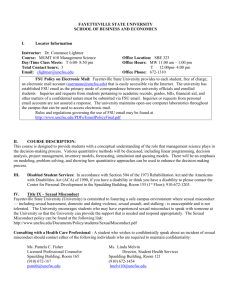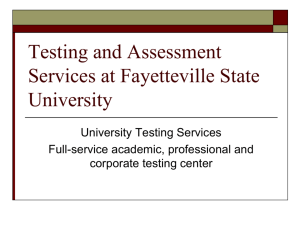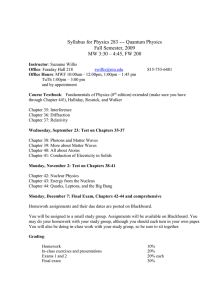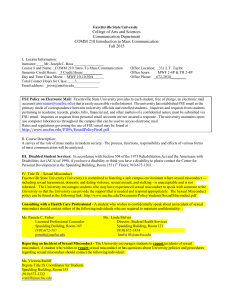Fayetteville State University College of Arts and Sciences Department of Criminal Justice
advertisement
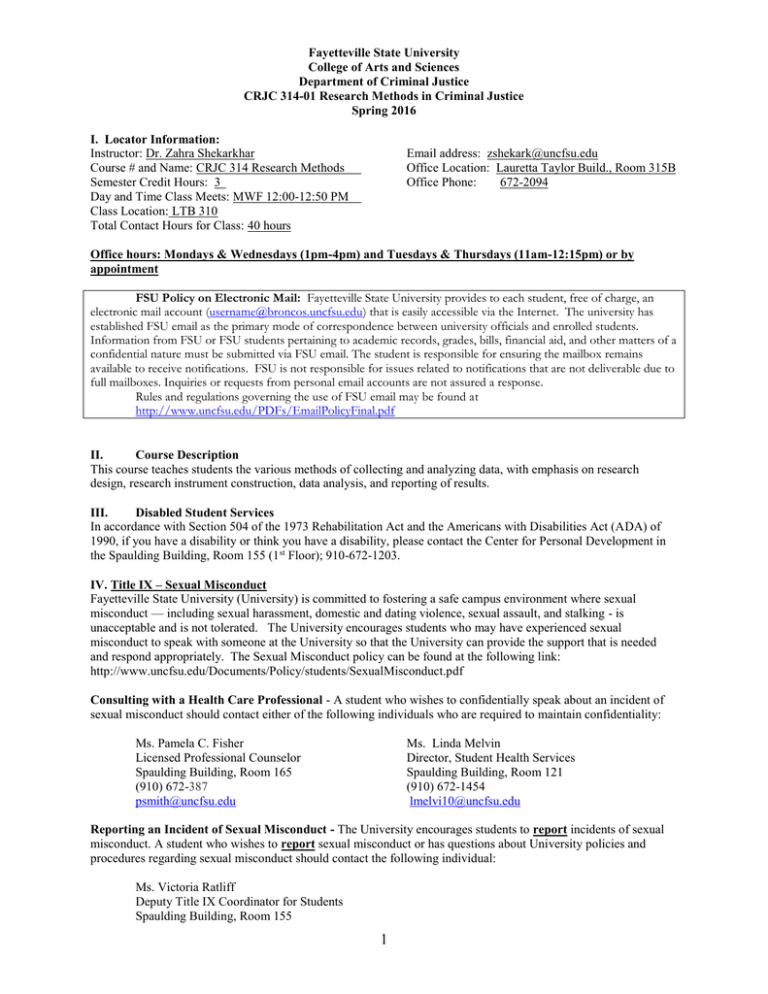
Fayetteville State University College of Arts and Sciences Department of Criminal Justice CRJC 314-01 Research Methods in Criminal Justice Spring 2016 I. Locator Information: Instructor: Dr. Zahra Shekarkhar Course # and Name: CRJC 314 Research Methods Semester Credit Hours: 3 Day and Time Class Meets: MWF 12:00-12:50 PM Class Location: LTB 310 Total Contact Hours for Class: 40 hours Email address: zshekark@uncfsu.edu Office Location: Lauretta Taylor Build., Room 315B Office Phone: 672-2094 Office hours: Mondays & Wednesdays (1pm-4pm) and Tuesdays & Thursdays (11am-12:15pm) or by appointment FSU Policy on Electronic Mail: Fayetteville State University provides to each student, free of charge, an electronic mail account (username@broncos.uncfsu.edu) that is easily accessible via the Internet. The university has established FSU email as the primary mode of correspondence between university officials and enrolled students. Information from FSU or FSU students pertaining to academic records, grades, bills, financial aid, and other matters of a confidential nature must be submitted via FSU email. The student is responsible for ensuring the mailbox remains available to receive notifications. FSU is not responsible for issues related to notifications that are not deliverable due to full mailboxes. Inquiries or requests from personal email accounts are not assured a response. Rules and regulations governing the use of FSU email may be found at http://www.uncfsu.edu/PDFs/EmailPolicyFinal.pdf II. Course Description This course teaches students the various methods of collecting and analyzing data, with emphasis on research design, research instrument construction, data analysis, and reporting of results. III. Disabled Student Services In accordance with Section 504 of the 1973 Rehabilitation Act and the Americans with Disabilities Act (ADA) of 1990, if you have a disability or think you have a disability, please contact the Center for Personal Development in the Spaulding Building, Room 155 (1st Floor); 910-672-1203. IV. Title IX – Sexual Misconduct Fayetteville State University (University) is committed to fostering a safe campus environment where sexual misconduct — including sexual harassment, domestic and dating violence, sexual assault, and stalking - is unacceptable and is not tolerated. The University encourages students who may have experienced sexual misconduct to speak with someone at the University so that the University can provide the support that is needed and respond appropriately. The Sexual Misconduct policy can be found at the following link: http://www.uncfsu.edu/Documents/Policy/students/SexualMisconduct.pdf Consulting with a Health Care Professional - A student who wishes to confidentially speak about an incident of sexual misconduct should contact either of the following individuals who are required to maintain confidentiality: Ms. Pamela C. Fisher Licensed Professional Counselor Spaulding Building, Room 165 (910) 672-387 psmith@uncfsu.edu Ms. Linda Melvin Director, Student Health Services Spaulding Building, Room 121 (910) 672-1454 lmelvi10@uncfsu.edu Reporting an Incident of Sexual Misconduct - The University encourages students to report incidents of sexual misconduct. A student who wishes to report sexual misconduct or has questions about University policies and procedures regarding sexual misconduct should contact the following individual: Ms. Victoria Ratliff Deputy Title IX Coordinator for Students Spaulding Building, Room 155 1 (910) 672-1222 vratliff@uncfsu.edu Unlike the Licensed Professional Counselor or the Director of Student Health Services, the Deputy Title IX Coordinator is legally obligated to investigate reports of sexual misconduct, and therefore cannot guarantee confidentiality, but a request for confidentiality will be considered and respected to the extent possible. Students are also encouraged to report incidents of sexual misconduct to the University’s Police and Public Safety Department at (910) 672-1911. V. Textbook Maxfield and Babbie (2012). Research Methods for Criminal Justice and Criminology. 3rd Edition. Wadsworth Publishing. VI. Student Learning Outcomes Upon completion of this course, students will be able to: explain the basic elements required to conduct social research compare and contrast the purposes of social research differentiate ethical from unethical research practices interpret and critique existing social science research VII. Course Requirements and Evaluation Criteria Grades will be based on examinations, assignments, and article reviews. Exams and assignments will cover material from the textbook as well as class discussions and lectures. Therefore, it is critical that students attend class on a regular basis. Method of Evaluation Exam #1 Exam #2 Research Proposal & Presentation Assignments Human Subjects Training 100 pts. 100 pts. Grading: Grade A Percent 90-100 Points 540-600 150 pts. 200 pts. 50 pts. 600 pts. B C D F 80-89 70-79 60-69 less than 60 480-539 420-479 360-419 359 or less Exams: Two exams will be given. The exams will consist of multiple choice, true/false, and short answer questions. A student can only make-up an exam with documented valid evidence – the determination of valid evidence will be made by the instructor. Each exam is worth 100 points or ~16.67% of your final grade. In total, both exams are worth ~33.3% of your final grade. Research Proposal and Presentation: Students will write a research proposal and present their work. Detailed information regarding the proposal will be given to students. During the presentation of the proposals, students MUST be present in class – for every presentation day missed, the student will lose10 points on their own final proposal. The proposal and presentation will be worth 150 points or 25% of your final grade. Assignments: Students will be given a number of in-class assignment and take-home assignments throughout the semester. Assignments will be worth a varying amount of points, and may not be announced in advance, thus it is important that you notify me immediately if you are absent. Please see my policy of late/missed assigned below. In total, assignments will be worth 200 points, or ~33.3% of your final grade. Human Subjects: Students will complete NIH “Protecting Human Research Subjects” online training. The link to this training course will be provided to students. This assignment is worth 50 points or ~8.33% of your final grade. Review: A review sheet will be handed out two class sessions before each exam. A review session will be held at the class meeting before the exam. Students are expected to complete as much of the review as possible and come to the review session prepared to ask questions or obtain clarification of items on the review sheet. 2 Electronic Devices: All electronic devices (cell phones, smart phones, PDA’s, I-Pods, etc.) MUST be turned off/set to silent and put away during class times AND during in-class exercises and exams. Students who use these electronic devices during in-class exercises and/or exams will receive 0 points for that assignment/exam. Blackboard: This course utilizes Blackboard and all students are expected to monitor Blackboard regularly for announcements and to use it to obtain important course documents and information. Email Policy- “Netiquette”: Email can be a really powerful communication tool. However, there is room for misunderstanding and miscommunication, and this reduces its effectiveness. To facilitate smooth online interactions, there are a few rules regarding the use of email I’d like you to follow. FSU provides you with a free email address. Please make it the primary email address for all communications regarding this class. Email is my main point of electronic communication. Regularly check your FSU email for communications from me. This is especially smart since you will be notified by email of any changes posted to Blackboard. I will answer emails in a timely fashion. If you do not receive a response from me within 24 hours of emailing me, then please email me again. I will not answer emails regarding exams or assignments after 5pm on the day before an exam or assignment due date. In the subject line of your email please write “Criminal Justice Methods or Research Methods.” Begin your email with a greeting (e.g., Dear Professor) and include your full name within the message, preferably at the closing. Also include which section of Methods you are in. Please be careful not to misspell my last name in any communication with me, it is unprofessional. Respond to my emails in a timely fashion. Be sure to write your email as you would write a paper. That is, use capital letters where capital letters are supposed to go, use punctuation, and do not write like you are sending a text message. I will not respond to emails if they are unprofessional; please be sure to use appropriate and respectful language and structure in your communications with me. If you do not follow these rules you will not receive a response from me. Student Behavior Expectations: The instructor will respect all students and will make every effort to maintain a classroom climate that promotes learning for all students. Students must accept their responsibility for maintaining a positive classroom environment by abiding by the following rules: 1. 2. 3. 4. 5. 6. Students are expected to arrive on time, remain in class until dismissed by the instructor, and refrain from preparing to leave class until it is dismissed. Student/teacher relationships, as well as relationships among peers, must be respectful at all times. Students are not permitted to wear headphones or other paraphernalia that may be distracting to the classroom environment. Students must refrain from any activity that will disrupt the class; this includes turning off cell phones and pagers. Students are not permitted to use profanity in the classroom. Students will not pass notes to carry on private conversations while class is being conducted. Consequences for Failing to Meet Behavioral Expectations: The first time a student violates one of these rules, the instructor will warn him or her privately, either after class or before the next class. (Faculty members reserve the right to warn students publicly if needed.) The second time a student violates the guidelines, the instructor may deduct as many as twenty points from the student’s next exam grade. If a student violates the guidelines three times, the instructor will report the student to the Dean of Students for disciplinary action according to the FSU Code of Student Conduct. Academic Dishonesty: Any student found guilty of academic dishonesty will be subject to disciplinary actions as described in the student handbook. For the first offense, the student will receive a 0 for the exam, quiz, or assignment. For the second offense, the student will receive a failing grade for the course. Academic dishonesty includes, but is not limited to the following: cheating, plagiarism, complicity to academic dishonesty (helping or attempting to help another 3 student cheat) and misrepresentation to avoid academic work (e.g. fabricating excuses of an illness, injury, accident, family death, etc. to avoid the timely submission of academic work). Late Assignments & Makeup Policy: All course requirements must be completed on-time. If you are absent from class the day we have an in-class assignment it is your responsibility to contact me within 48 hours of the missed class. In order to makeup the assignment for full credit you must provide me with legitimate documentation regarding your absence (school sponsored activity, hospitalization, doctor’s visit, child’s doctor’s visit, meeting with probation/parole officer, traffic ticket, police report, bail papers, etc.). If you do not have a legitimate absence, you may still makeup the assignment, but must notify me within 24 hours of the absence and a 20% grade penalty will apply. If you notify me after 24 hours, that penalty will increase by 10% for each 24 hour period that goes by. For example, if you are absent on class on a Tuesday we do an in-class activity, you must notify me by Wednesday at 9:30am to ask for a makeup (20% penalty will apply). If you notify me after 9:30am on that Wednesday, you will receive a 30% penalty; if you notify me after 9:30am on that Thursday, you will receive a 40% penalty; and so on. If you have not contacted me within 7 days of your absence, you are no longer eligible to makeup the work. For any other assignment (such as take-home assignments) due on a specified date and time, any late work will receive a 20% grade penalty for the first 24 hours it is late (unless you have proper documentation excusing your absence such as the reasons listed above). After 24 hours, the assignment will be subject to an additional 10% penalty for every additional 24 hours it is late. If the assignment is not turned in within 7 days of the original due date, you will receive a zero. If you are absent on an exam day, a makeup will only be given if you have legitimate documentation regarding your absence (school sponsored activity, hospitalization, doctor’s visit, child’s doctor’s visit, meeting with probation/parole officer, traffic ticket, police report, bail papers, etc.). The makeup may not be in the same format as the original exam. Tips for getting a good grade Take notes during class. I suggest you print the lecture powerpoints before class so you are not trying to write down everything on the slides; instead you take notes on what is not on the slides. Complete the readings on a weekly basis so you do not get behind. Take notes on the readings as you go along. Ask questions during class, office hours, or through email on any material you do not understand. Give yourself sufficient time to study before the exam. DO NOT PLAY WITH YOUR CELL PHONE. VIII. Academic Support Resources: This course uses Blackboard to disseminate course materials such as lectures, readings, and assignments. If you have any trouble assessing Blackboard or specific course materials please contact me as soon as possible to help remedy the situation. Please contact ITTS for Blackboard assistance at http://www.uncfsu.edu/itts or call 910-672-4357. 4 IX. Course Outline and Reading Schedule *Note: Schedule subject to change. Week/Dates Week 1- 1/11, 1/13, 1/15 Topic Introduction Reading Chapter 1 Criminal Justice and Scientific Inquiry Week 2- 1/18 (No Class), 1/20, 1/22 Ethnics and Criminal Justice Research Chapter 2 Week 3- 1/25, 1/27, 1/29 General Issues in Research Design Chapter 3 Week 4- 2/1, 2/3, 2/5 Concepts, Operationalization, and Measurement Chapter 4 Week 5- 2/8, 2/10, 2/12 Sampling Chapter 6 Week 6- 2/15, 2/17, 2/19 Part #1 of Research Proposal Due on 2/19 Week 7- 2/22, 2/24, 2/26 Lecture Wrap Ups Week 8- 2/29, 3/2, 3/4 3/4 EXAM I Week 9- 3/7, 3/9, 3/11 SPRING BREAK NO CLASS Week 10- 3/14, 3/16, 3/18 Experimental and QuasiExperimental Designs Chapter 5 Week 11- 3/21, 3/23, 3/25 Survey Research and Other Ways of Asking Questions Chapter 7 Human Subjects Training Certificate Due on 3/25 Week 12- 3/28, 3/30, 4/1 Field Research Chapter 8 Week 13- 4/4, 4/6, 4/8 Agency Records, Content Analysis, and Secondary Data Chapter 9 Week 14- 4/11, 4/13, 4/15 (No Class) Evaluation Research and Problem Analysis Chapter 10 5 Week 15- 4/18, 4/20, 4/22 Presentations Week 16- 4/25 & 4/27 (Last Day) Final Research Proposal Due on 4/27 Week 17- Final Exam Week EXAM II Wednesday, May 4th at Noon X. Teaching Strategies This course will consist mainly of lectures with some days designated as in-class discussions. XI. Bibliography Bachman and Schutt (2003). The Practice of Research in Criminology and Criminal Justice. 2nd Edition. Sage Publications. Neuman (2007). Basics of Social Research: Qualitative and Quantitative Approaches. 2nd Edition. Pearson/Allyn and Bacon Publishers. Patten (2005). Understanding Research Methods. 5th Edition. Pyrczak Publishing. Strand and Weiss ( 2005). Experiencing Social Research: A Reader. Allyn and Bacon Publishers. Tewksbury and Mustaine (2004). Controversies in Criminal Justice Research. Anderson Publishers. 6
